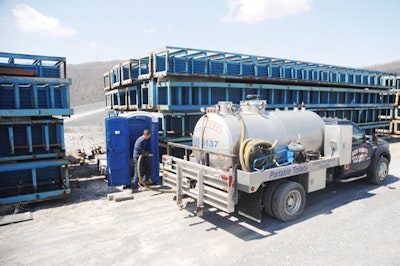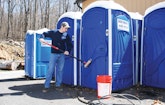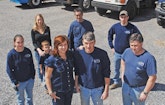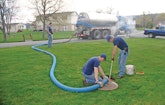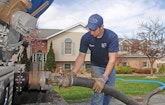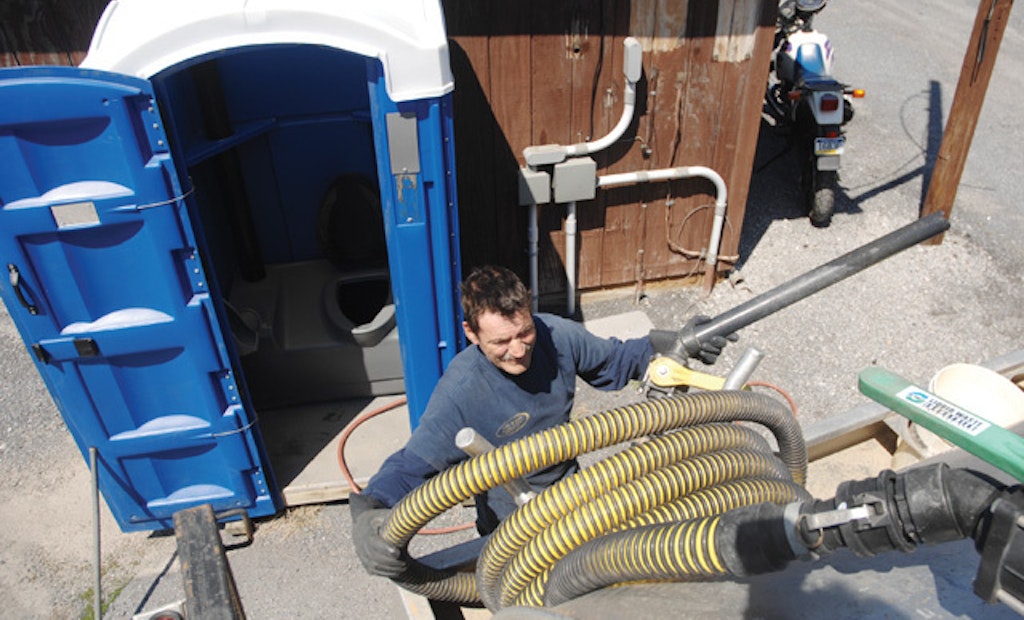
Interested in Trucks?
Get Trucks articles, news and videos right in your inbox! Sign up now.
Trucks + Get AlertsKen Wertz is a ball of energy and ambition, always has been. “I can’t sit still, so I’m always looking for something new to do,” he admits. That constant search for new challenges is paying off for Ken and his wife, Robin, owners of Ken Wertz Hauling & Septic Services, Hollidaysburg, Pa.
A drive to diversify, attention to customer service and a sharp-dressed staff are keys to the family company enjoying growth through a stagnant economy over the past few years. One business offering always seems to lead to another, and, most recently, the company has been building up its portable sanitation service.
TALKING TRASH
In 1979, Ken went to work for a local trash collection contractor. Two months later, his boss sold him the business: a dump truck and a list of 125 customers. Wertz was ecstatic to be his own boss. “Ken’s a hands-on kind of guy,” explains Robin, who is the company’s executive business administrator. “He likes to jump right into things.”
“Dad had a Chevy C30 flatbed with a 10-foot bed and 6-foot sides,” Ken recalls. “I started using that for trash hauling.” Each year or so, Ken would add more vehicles and equipment as cash flow permitted, never allowing himself the luxury of using credit. “We pay cash by saving as we go,” he says, careful never to over-extend themselves or to over-anticipate the market.
He began buying related local businesses in 1992. One was a neighbor’s septic pumping company with an early ’80s model Chevy C70 vacuum truck, a 2,000-gallon tank, diaphragm pump, and a list of about 400 customers, mostly residential. Ken felt comfortable with the many similarities to his solid waste company.
Over the next few years, he would drive existing routes and establish new ones as needed. Then he’d hire someone to manage and run that part of the business, training him or her, telling them exactly what to do, how to do it and why he wanted it done that way.
The Wertzes’ son, 21-year-old Ken Wertz III, worked in various facets of the business as he grew up. He started driving a portable restroom route when he graduated from high school. Their daughter, Melissa Wertz Delbiondo, 24, is the office manager.
The Wertzes kept their eyes and ears open for other expansion opportunities. They began getting calls asking for roll-off containers. “Most of our business moves start with customer inquiry,” Robin says. “You’ve got to make sure there’s demand before you jump into any market.” In 1996, Ken saw advertisements for small (10- to 15-yard) trash containers, ideal for spring cleanup projects or do-it-yourself roofing jobs. He decided it was time to add that equipment and service.
ADDING PORTABLE RESTROOMS
The couple began attending the Pumper & Cleaner Environmental Expo International in 2000 as a way to stay abreast of industry developments. Robin recalls: “We’d gotten calls once in a while for portable restrooms, and realized maybe we should get into that. That very first year, we bought 10 restrooms at the show.”
The couple saved money and bought more units as needed, one trailer load at a time. They continued to attend the Expo as a shopping trip where they could talk to manufacturer representatives in person. “You get to see how they’re made and compare,” Ken says. “We like to buy American-made and look for durability that will stand up. How they look is nice, but if they don’t hold up, that’s no bargain.”
Talking to knowledgeable vendors was key to making confident buying decisions, according to Robin. “The reps gave us lots of helpful hints for approaching the market, too.”
Though trash collection remains a mainstay of their business, pumping and portables are significant and growing segments. Portable sanitation is the second-largest segment, with roughly 75 percent of that business in construction and the remainder in special events. Septic service comes in third.
BUILT FOR WORK
The Wertzes add vehicles and equipment as needed and on a cash basis, used when possible. Septic pumping trucks include a 1995 International 8200 with a 3,750-gallon steel tank and a Masport HXL 400W pump; and a 1990 International 4900 built by Binkley & Hurst LP in Lititz, Pa., with a 2,500-gallon steel tank and Masport HXL15 pump. Portable sanitation trucks are a 2006 Ford F-550 with Jurop PN33 vacuum pump, Moro water pump and 700-gallon waste/300-gallon brine/100-gallon freshwater aluminum tank from Robinson Septic Service Inc.; a 2004 Ford F-550 with Masport V4 vacuum pump, DC10 wash-down pump and 700-gallon waste/300-gallon brine/100-gallon freshwater steel tank from Pik Rite Inc.; and a 2004 Trac Air 10-unit transport trailer built by Lane’s Vacuum Tank Inc.
The portable restroom inventory consists of 310 units, with 252 Taurus, 20 Global and three Global 1.5 units from Satellite Industries Inc. and 28 Aspen models from Five Peaks Technology. ADA-compliant units include five Matterhorn, one World Care and one Liberty model from Satellite. Hand-wash stations include five Sierra Sidekick units from Five Peaks and two Tuff-Jon models by T.S.F. Company Inc.
CUSTOMER CARE
Constant contact is part of being responsive to customer needs. Another part may entail turning work down, but still being helpful. If the Wertzes can’t help a caller due to distance, they’ll refer someone who can. “We have a good relationship with our competitors,” Robin explains. “It’s not cutthroat in our territory, but very much a mutual aid atmosphere. We used to call these associates, too, before our son came into the business when we needed fill-in work done.” This was an important factor in the company’s growth.
Good follow-up with customer problems or questions also is key to the service the Wertzes demand of themselves and their staff. “People appreciate us calling back if we were on the phone when they called,” Robin says. “We only use voicemail for busy lines or lunch break and after business hours, but during business hours, people will talk to a live person.”
Another major factor in their growth is a sharp, professional appearance. “We’ve had customers tell us they wanted to work with us because of our clean units and clean trucks,” Ken says. Realizing its value in making first impressions and maintaining an ongoing image, he is meticulous about keeping trucks and equipment clean. Even roll-off containers are kept rust-free and freshly painted.
UP IN A DOWN ECONOMY
The recession hasn’t put a big dent in profits for Wertz. In fact, the company purchased a truckload of new restrooms at the 2010 Pumper & Cleaner Expo, as Ken has every year since adding that service. “We’re not sure if it was stimulus money or what, but construction work has actually been growing here,” he says. “Housing construction is down overall, but there are some commercial projects. We were busier last year than the year before.” Now he’s awaiting delivery of a 2005 Volvo, once a dump truck, now being refitted by Martin’s Welding & Repair in Curryville, Pa., with a 4,250-gallon aluminum tank and Jurop LC420 pump to join the septic pumping fleet.
Part of this success may be due to a low-key but consistent promotional strategy. “I do think if you want to stay busy, you need to nurture repeat business. We’ll call our special events customers to make sure everything is going well during the event, and follow up to make sure they’re satisfied,” Robin says.
When it comes to seeking new business, they originally sent letters to current construction customers and others they found through phone book advertising. It was their most successful promotion ever, resulting in all 10 of their original units being fielded for the entire year. The company has since ceased direct mail advertising, instead relying heavily on its website and phone book ads to generate new calls. “We probably split our marketing budget 50/50 between traditional print and the Web,” Robin says.
They do have a list of regular septic pumping customers who appreciate the reminder calls Wertz makes every two to three years. “We’ll take our cue from them: If they want a simple notification call, we do that. If they seem to want or need more information, we’ll do some education about their systems or pumping in general. We try to be sensitive to their personal needs.”
WHAT LIES AHEAD?
The market will continue to drive new business initiatives for the Wertzes. Robin says in their area, “We’re noticing people want something they can afford in portables. So we tailor our equipment purchases to being able to give better value.”
They replace vehicles before they start nickel-and-diming them, and purchase quality used trucks when possible. They’re taking the same approach to possibly adding a high-end events trailer, since they’ve had quite a few inquiries.
“You always have to pay attention to the balance between what you need and what your customer can afford. Everybody’s trying to do everything right now the most economical way,” Ken says.
